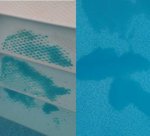A week or so ago our 10 year old heater gave out -- it started leaking a noticeable amount of water, and a technician opened it up, showed me part of the disintegrating core, and said it was not worth repairing and should be replaced, so we did.
Previous to this I had noticed the ph was very low, perhaps close to 6.0, and subsequently it of course remained so. After the new heater was installed, over the course of a few days I dumped 4-5 lbs of sodium carbonate based "ph+" into the pool, which is ~15,000 gallons. The ph was still low, ~6.5, when my sister and her kids came over for the afternoon. There were a bunch of us in the water for over an hour, and some of us came out with blue staining on skin, hair, and swimwear. Most of this proved easy to wash out. The water also had a very hard taste, and the "hardness" square on a test strip is very very high. After searching around a bit I realized this of course was probably high copper content, presumably from bits of broken off and dissolved heater core, so I got some "Stain Prevent" liquid intended to "make pool minerals and metal inactive" and "Pool Water Clarifier", a powder which is added through the skimmer to form a "jelly mat" in the sand filter to help strain out fine particles.
The latter recommended the ph and alkalinity, which was also very low (~30-40 ppm), be brought into balance. I added about 10 lbs. of presumably bicarbonate based alkalinity booster and another 2-3 lbs of ph+.
This raised the alkalinity and ph somewhat but they are still too low, I think about 6.8 and 50-60 ppm based on test strips; I went ahead with the Stain Prevent and Clarifier anyway since there was enough for several doses.
The next day I found large areas of what I now believe is some kind of presumably very diffused but crystalline copper carbonate sediment.

Vacuuming this up works somewhat in that part of it does get trapped in the sand filter and can be backwashed out, but much of it very visibly just comes back out the jets, so the only thing I've been able to do is dump it straight out via waste. Unfortunately, it is very fine and easily disturbed, so after one 15 minute session (which lowered the water level by 1-2") I still only removed perhaps 10-20%; I'll be able to guesstimate better once it settles again. A very tedious cycle.
Does anyone have any suggestions about this? Am I wrong about it being copper carbonate? That is a bit worrying since wikipedia notes it is an effective algaecide (in fact, I think used in pools as such), but also potentially "toxic to humans".
Previous to this I had noticed the ph was very low, perhaps close to 6.0, and subsequently it of course remained so. After the new heater was installed, over the course of a few days I dumped 4-5 lbs of sodium carbonate based "ph+" into the pool, which is ~15,000 gallons. The ph was still low, ~6.5, when my sister and her kids came over for the afternoon. There were a bunch of us in the water for over an hour, and some of us came out with blue staining on skin, hair, and swimwear. Most of this proved easy to wash out. The water also had a very hard taste, and the "hardness" square on a test strip is very very high. After searching around a bit I realized this of course was probably high copper content, presumably from bits of broken off and dissolved heater core, so I got some "Stain Prevent" liquid intended to "make pool minerals and metal inactive" and "Pool Water Clarifier", a powder which is added through the skimmer to form a "jelly mat" in the sand filter to help strain out fine particles.
The latter recommended the ph and alkalinity, which was also very low (~30-40 ppm), be brought into balance. I added about 10 lbs. of presumably bicarbonate based alkalinity booster and another 2-3 lbs of ph+.
This raised the alkalinity and ph somewhat but they are still too low, I think about 6.8 and 50-60 ppm based on test strips; I went ahead with the Stain Prevent and Clarifier anyway since there was enough for several doses.
The next day I found large areas of what I now believe is some kind of presumably very diffused but crystalline copper carbonate sediment.

Vacuuming this up works somewhat in that part of it does get trapped in the sand filter and can be backwashed out, but much of it very visibly just comes back out the jets, so the only thing I've been able to do is dump it straight out via waste. Unfortunately, it is very fine and easily disturbed, so after one 15 minute session (which lowered the water level by 1-2") I still only removed perhaps 10-20%; I'll be able to guesstimate better once it settles again. A very tedious cycle.
Does anyone have any suggestions about this? Am I wrong about it being copper carbonate? That is a bit worrying since wikipedia notes it is an effective algaecide (in fact, I think used in pools as such), but also potentially "toxic to humans".

